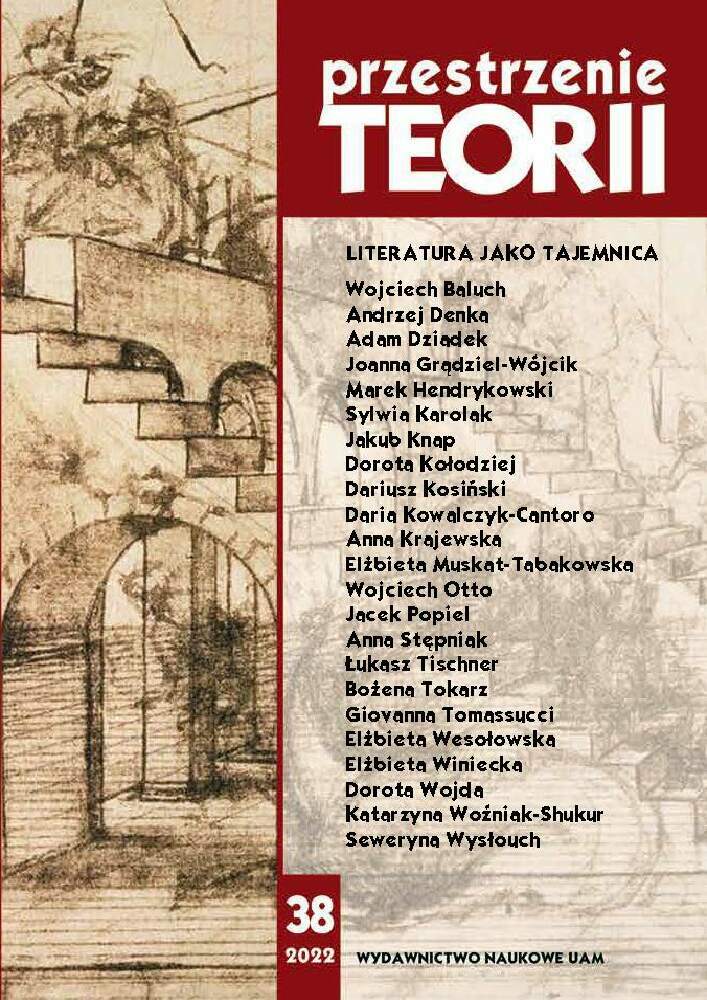Abstract
This article concerns secrets and secrecy in narrative works. The author, following in the footsteps of Auerbach and Kermode, argues that secrets should be understood as discontinuous places, gaps that demand to be filled. Auerbach and Kermode pointed to the biblical origins of the secret narrative. The latter in The Genesis of Secrecy. On the Interpretation of Narrative noted that secrets presuppose a mode of initiation – this was the case in the gospel of St Mark he analysed, addressed to believers. However, this sender’s intention also appears in strictly literary texts that operate the convention of the secret. This article refers to four twentieth-century Polish narrative texts that use elements of secrecy in different ways. Mrożek’s Moniza Clavier conceals the confabulatory character of the first-person statement, Miłosz’s Dolina Issy and Gombrowicz’s Kosmos conceal the deeply autobiographical character of the reflection on individual fate, while the narrative in Lem’s Solaris activates the possibility of ‘vertical reading’, referring to the concept of some absolute. Secrets in literary texts tend to be secularized versions of religious narratives addressed to the initiated, and the promise of an integration of discontinuous places attracts sceptics and believers.
References
Arystoteles, Poetyka, przeł. H. Podbielski, Warszawa 1988, s. 333.
Auerbach E., Mimesis. Rzeczywistość przedstawiona w literaturze Zachodu, przeł. Z. Żabicki, Warszawa 2004.
Csicsery-Ronay I., Jr., Książka jest Obcym: O pewnych i niepewnych interpretacjach „Solaris” Stanisława Lema, przeł. T. Rachwał, [w:] Lem w oczach krytyki światowej, wyb. i oprac. J. Jarzębski, Kraków 1989.
Fiut A., Dolina Issy – przypowieść o wtajemniczeniu, „Znak” 1981, nr 4–5, s. 476.
Gajewska A., Stanisław Lem. Wygnany z wysokiego zamku. Biografia, Kraków 2021.
Gajewska A., Zagłada i gwiazdy. Przeszłość w prozie Stanisława Lema, Poznań 2016.
Gombrowicz W., Dziennik 1961–1966, Dzieła, Kraków 1987.
Gombrowicz W., Dziennik 1967–1969, Dzieła, Kraków 1992.
Gombrowicz W., Kosmos, Dzieła, Kraków 1986.
Gombrowicz W., Trans-Atlantyk, Pisma zebrane, oprac. M. Bielecki, Kraków 2017.
Gorczyńska R. (E. Czarnecka), Podróżny świata. Rozmowy z Czesławem Miłoszem. Komentarze, Kraków 1992.
Jarzębski J., Dwanaście wersji „Kosmosu”, [w:] idem, Natura i teatr. 16 tekstów o Gombrowiczu, Kraków 2007.
Jonas H., Idea Boga po Auschwitz, przeł. G. Sowinski, wst. J.A. Kłoczowski, Kraków 2003.
Kermode F., Pleasure and Change. The Aesthetics of Canon, New York 2004.
Kermode F., Sekrety i narracyjne sekwencje, przeł. P. Czapliński, „Pamiętnik Literacki” 1993, nr 2.
Kermode F., The Genesis of Secrecy: On the Interpretation of Narrative (The Charles Eliot Norton Lectures), Cambridge (Mass.) – London 1979.
Libera A., „Kosmos” (wizja życia – wizja wszechświata), [w:] Gombrowicz i krytycy, red. Z. Łapiński, Kraków 1984.
Miłosz Cz., Dolina Issy, Dzieła zebrane, Kraków 2000.
Miłosz Cz., Przypis po latach, [w:] idem, Dolina Issy, Dzieła zebrane, Kraków 2000.
Mrożek S., Baltazar. Autobiografia, Warszawa 2009.
Mrożek S., Opowiadania 1974–1979, Dzieła zebrane, t. V, Warszawa 1997.
Nabokov V., Wykłady o literaturze, przeł. Z. Batko, Warszawa 2005.
Neuger L., „Kosmos” Witolda Gombrowicza. Genologiczne podstawy hipotez sensowności, „Teksty Drugie” 1999, nr 6.
Tischner Ł., Gombrowicza milczenie o Bogu, Kraków 2013.
Tischner Ł., Sekrety manichejskich trucizn. Miłosz wobec zła, Kraków 2001.
Tokarczuk O., Księgi Jakubowe albo wielka podróż przez siedem granic, pięć języków i trzy duże religie, nie licząc tych małych. Opowiadana przez zmarłych, a przez autorkę dopełniona metodą koniektury, z wielu rozmaitych ksiąg zaczerpnięta, a także wspomożona imaginacją, która to jest największym naturalnym darem człowieka. Mądrym dla memoryału, kompatriotom dla refleksji, laikom dla nauki, melancholikom zaś dla rozrywki, Kraków 2014.
License

This work is licensed under a Creative Commons Attribution-NonCommercial-NoDerivatives 4.0 International License.
Authors
Authors of texts accepted for publication in Przestrzenie Teorii are required to complete, sign and return to the editor's office the Agreement for granting a royalty-free license to works with a commitment to grant a CC sub-license.
Under the agreement, the authors of texts published in Przestrzenie Teorii grant the Adam Mickiewicz University in Poznań a non-exclusive, royalty-free license and authorize the use of Attribution-NonCommercial-NoDerivatives 4.0 International (CC BY-NC-ND 4.0) Creative Commons sub-license.
The authors retain the right to continue the free disposal of the work.
Users
Interested Internet users are entitled to use works published in Przestrzenie Teorii since 2015, for non-commercial purposes only, under the following conditions:
- attribution - obligation to provide, together with the distributed work, information about the authorship, title, source (link to the original work, DOI) and the license itself.
- no derivatives - the work must be preserved in its original form, without the author's consent it is not possible to distribute the modified work, such as translations, publications, etc.
Copyrights are reserved for all texts published before 2015.
Miscellaneous
Adam Mickiewicz University in Poznań retains the right to magazines as a whole (layout, graphic form, title, cover design, logo etc.).

